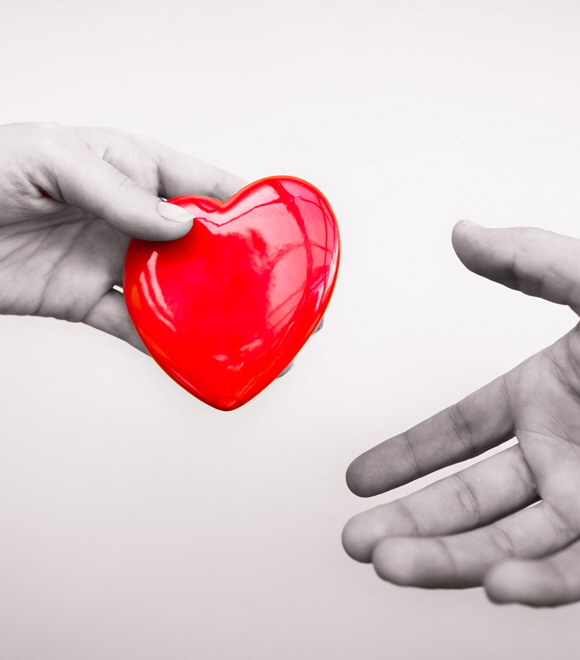

Why should you receive treatment
at the AMC Heart Failure & Cardiac Transplantation Center?
AMC’s Heart Failure & Cardiac Transplantation Center performs more than 30 heart transplantations a year since its first successful heart transplantation in Korea in 1992. The center prides in its world-class performance for its success rate exceeds 96%. Patients on a heart-lung machine treated at other hospitals are also referred to AMC for the treatment of heart failure (medical care and transplantation). The center operates a 24-hour emergency system for more efficient and safer medical treatment of emergency patients and provides international research and education programs to support medical advancement and train medical professionals.
The Heart Failure & Cardiac Transplantation Center offers treatment support services such as a one-day program, a fast-track system, heart disease counseling and reservation, and interpretation services.
Treatment options

Drug therapy
Drug therapy includes diuretics, vasodilators (often, angiotensin converting enzyme inhibitor, ACEi), and cardiac stimulants. Diuretics such as furosemide are commonly used. Vasodilators are used only when there is increased peripheral vascular resistance and when orthostatic hypotension or kidney disease is not present. Combined use of diuretics, vasodilators, and cardiac stimulants should be considered if symptoms get worse. Patients should avoid intense physical activity depending on the severity of heart failure, but regular cardio exercise is recommended because reduced physical activity would rather lead to psychological problems.
1) Diuretics
Diuretics are used to reduce excess fluids from the body and control weight by inhibiting the reabsorption of sodium in the renal tubule and facilitating the secretion of sodium to increase the amount of urine
2) Vasodilators
Vasodilators are used to decrease the heart’s workload by dilating blood vessels (changing peripheral vascular capacity and resistance). Reducing the heart’s afterload increases the cardiac output, and reducing the heart’s preload eases symptoms caused by pulmonary congestion.
3) Cardiac stimulants
Digitalis
Digitalis has long been used to increase heart contractability by directly working on the cardiac muscle. It is hardly effective in the cardiac muscle with organic disorders, but highly effective in heart failure caused by excessive burden on cardiac muscle such as hypertension, valvular heart disorders, and artery hardening. It is also helpful in heart failure accompanied with atrial fibrillation. However, this drug should be used carefully because of its narrow therapeutic index.
Sympathomimetic drug
Sympathomimetic drugs are used in combination with dobutamine or dopamine to treat acute heart failure. It stimulates the sympathetic nervous system receptors to bring about diuretic and cardiotonic effects.
4) Antiarrhythmic therapy
Arrhythmia causes 50% of sudden deaths in congestive heart failure patients; therefore, arrhythmia treatment is important in reducing mortality rates. Congestive heart failure patients who have previously experienced fatal arrhythmias or have arrhythmic symptoms should take antiarrhythmic drugs. However, this medicine should be used carefully because it has side effects that may hinder heart muscle contractibility to some degree or cause abnormal heart rhythms.

Heart transplantation
Heart transplantation is the replacement of a terminally-ill patient’s diseased heart with that of a healthy heart from a brain-dead donor. It is adopted as the last resort for advanced heart failure patients who have no response to drug therapy.
Artificial heart transplant (Ventricular assist device imolantation)
Heart transplantation is the standard treatment method for end-stage heart failure patients who do not respond to drug therapy. As a standard treatment for end-stage heart failure patients, heart transplantation can significantly improve early and late treatment outcomes. However, this option cannot be applied to all heart failure patients due to the long term administration of immunosuppressant and shortage of organ donors. For these reasons, ventricular assist device implantation (or the so-called artificial heart transplantation) was introduced as an alternative approach.
Ventricular assist devices that support the functioning of the heart are categorized according to the affected ventricle; they include the right ventricle assist device, the left ventricle assist device, and both ventricle assist device. A left ventricular assist device, for instance, is designed to act like the left ventricle. A tube is attached to the apex of the left ventricle. Blood is carried out from the left ventricle and sent through an artificial vessel attached to the aorta. Here, the device helps the heart pump blood into the aorta. In the past, the pump device was located outside the body. Today, however, the pump device is implanted inside the patient’s body. In this way, patients can be discharged from the hospital and continue with their everyday lives. Unfortunately, the battery cannot be installed inside the body. Therefore, patients need to carry a system controller and battery pack. A second battery is needed as well for the battery life is around 4-6 hours.
AMC’s treatment performance
Major surgeries and procedures / performance
| Name | Performance | Remarks |
|---|---|---|
| Heart transplantation | 900 (accumulated) | The largest number performed (45%) |
| Extracorporeal membrane oxygenation(ECMO) | 200/year |
Major medical facilities
| Devices | Unit | Devices | Unit |
|---|---|---|---|
| Aseptic ICU (heart transplantation patients only) | 3 | Operation room for heart surgery | 5 |
| ECMO | 14 | Aseptic room for transplant patients | 7 |
- The largest number of heart transplantations performed in Korea annually
- All patients on ECMO
- First heart transplantation performed in Korea in 1992
- Heart transplantation performed on the youngest patient in Korea in 2001
- The 600th heart transplantation performed in 2016
- First successful third-generation ventricular assist device implantation in Korea
